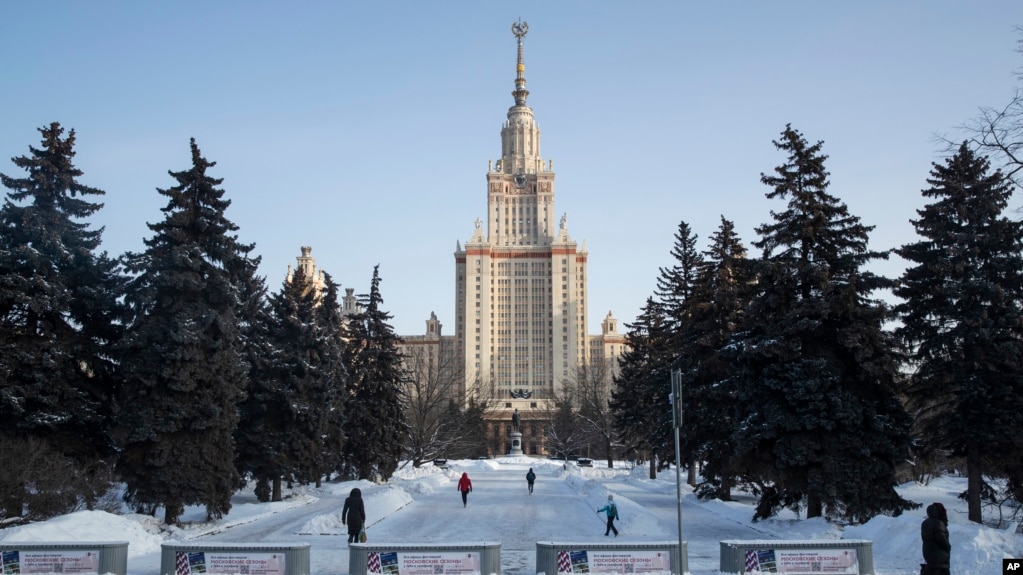How Russia’s War in Ukraine Will Hurt Academic Exchange

When Russia invaded Ukraine in late February, many Western governments acted to restrict trade and other exchange with Vladimir Putin’s government.
But the restrictions with Russia have not only affected the exchange of goods. The restrictions have also affected academic exchange.
Western students studying in Russia came home. Universities in the United States that offered support to Russian universities withdrew their financial and academic aid. Western scientists working with Russian scientists suspended their research.
Arik Burakovsky is an expert on international law and diplomacy at Tufts University in Massachusetts. He is also the assistant director of the Russia and Eurasia program at the university’s Fletcher School of Law and Diplomacy.
In an explainer written for The Conversation, Burakovsky said that the cutting of ties with Russian universities will harm academic exchange. He added that, without the exchange of ideas between Russians and Western scholars, President Vladimir Putin may be able to keep democratic ideas from coming into his country.
What kind of connections existed between Western and Russian universities?
Since the end of the Cold War in 1991, Burakovsky said, Russian and Western universities worked on academic exchange programs, lesson development and research projects.
As a result, Russia’s universities have become stronger.
Russian universities also built school buildings in former Soviet countries and offered their students chances to study abroad. In recent years, Russian universities taught more classes in English. This helped welcome students from other countries. Russian universities also created degree programs with Western universities. For example, there was a master’s degree offered by the Moscow School for the Social and Economic Sciences together with the University of Manchester in Great Britain.
What have the relationships produced?
Western and Russian students learned about each other’s cultures, languages and societies. Scientists worked together on projects related to space exploration, physics, climate change, Arctic biology and more.
That same year, Russia changed an education law and required government approval for all foreign academic partnerships. The law related to “propaganda” and “negative foreign influence in the educational process.”
Burakovsky said in his time at Tufts, he has overseen teaching and research exchanges with universities and research organizations in Moscow, Vladivostok and St. Petersburg. The exchanges permitted students to gain a better understanding of international policy.
But since March, that work has been considered “morally unacceptable” by leaders at his university.
Are future relationships between Western universities and Russian universities in trouble because of the war?
Burakovsky says: “yes.” While many academic leaders in the U.S. cautioned against moving too quickly, students are no longer permitted to study in Russia and most U.S. universities ended support of programs in Russia. A number of universities ended their financial investments in Russia as well.
For example, the Massachusetts Institute of Technology ended a partnership that had cost millions of dollars with the Skolkovo Institute of Science and Technology in Russia. The partnership had been in place since 2010.
What are the reasons both for and against breaking ties with Russia?
Britain also said it would remove funding for all research projects with links to Russia.
Chris Philp is Britain’s minister for technology and the digital economy. He said he does not see “how anyone in good conscience can collaborate with Russian universities.”
Philp and others who support ending attachments with Russia say it is a way to stand against Putin and his government. They also say breaking academic connections protects their countries from Russian spying, hurts Putin’s ability to spread propaganda and reduces Russia’s ability to steal technology.
Opponents of the stand against Russia say students and scholars are getting hurt. They add that the plan to detach from Russia sets a bad example for the future of international exchange.
They say that cooperating on work such as scientific research strengthens democracy and fights the spread of false ideas. Nations working together on research, they say, supports the idea that countries can work together to solve political problems, too.
In a speech at Imperial College in London, Harvard University president Lawrence Bacow spoke of the importance of keeping academic relations in place even in difficult political times.
However, Burakovsky notes that Harvard’s Davis Center for Russian and Eurasian Studies published a message condemning Russia’s invasion of Ukraine. The Davis Center said it would no longer work with Russian universities whose leaders signed a document offering their support for the war.
How will the broken connections affect higher education in Russia?
Burakovsky suggests the broken connections will hurt young Russian scholars. The moves also may help Putin’s government by making the students and teachers feel like there is no hope of help from the West.
Russian researchers say they feel the lack of connection with colleagues in other parts of the world. Russia said in March that it would not permit its scientists and educators to take part in international meetings.
Can Russian scholars safely speak against the invasion of Ukraine?
In short, Burakovsky says “no,” and points to recent laws in Russia that punish the spread of false information with up to 15 years in prison.
Educators in Russia risk losing their jobs and going to prison if they criticize the war. Many teachers, students and writers left the country on their own when the war started.
Words in This Story
academic – adj. relating to schools and education
scholar– n. a person who has studied a subject for a long time and knows a lot about it
lesson –n. a single class or part of a course of instruction
negative- adj. harmful or bad, not wanted
conscience- n. the part of the mind that makes you aware of your actions relating to right and wrong
collaborate- v. to work together on a project
colleague– n. a person who works with you
https://learningenglish.voanews.com/a/how-russia-s-war-in-ukraine-will-hurt-academic-exchange/6600905.html